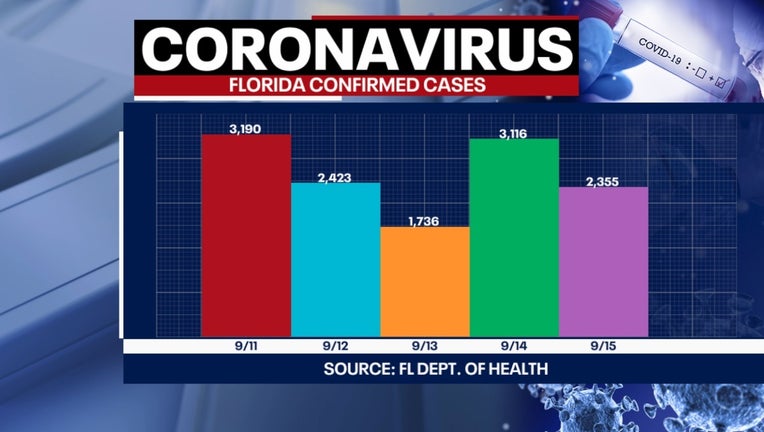Florida reports 152 more resident deaths, over 2,000 coronavirus infections

ORLANDO, Fla. - On Wednesday, Florida added 2,355 coronavirus cases, pushing the statewide total to 671,201, according to the Florida Department of Health.
An additional 152 Florida resident deaths were also reported. The death toll is now at 12,939 in the state.
The Florida Department of Health has not reported a daily increase above 10,000 infections since late July.
According to the Orlando Sentinel, over 4.9 million people have been tested in Florida.
The federal government outlined a sweeping plan Wednesday to make vaccines for COVID-19 available for free to all Americans, even as polls show a strong undercurrent of skepticism rippling across the land.
RELATED: Officials detail plan to provide COVID-19 vaccines for free
In a report to Congress and an accompanying “playbook” for states and localities, federal health agencies and the Defense Department sketched out complex plans for a vaccination campaign to begin gradually in January or possibly later this year, eventually ramping up to reach any American who wants a shot. The Pentagon is involved with the distribution of vaccines, but civilian health workers will be the ones giving shots.
Phase two of Florida's reopening is ongoing. The following is in effect:
- The 'Safe. Smart. Step-by-Step. Plan for Florida's Recovery' plan allows for restaurants to operate with 50 percent indoor seating capacity and full capacity outdoors with appropriate social distancing. Restaurants can also allow for bar-top seating.
- Bars, pubs, and taverns can operate with 50 percent capacity. Governor DeSantis is also looking at easing other coronavirus restrictions at restaurants and bars, like capacity limits and how far tables will be seated.
- Retail stores can currently operate at full capacity with appropriate social distancing and sanitization protocols. Many chains have included social distancing signage, sanitizing stations, and limited hours in their new safety measures.
- Amusement parks have reopened in Florida as well, all with limited capacity and enhanced safety measures to protect both park guests and employees.
- Gyms can operate at full capacity with appropriate social distancing and sanitization.
- Movie theaters, concert houses, auditoriums, playhouses, bowling alleys, and arcades can operate at 50 percent capacity with appropriate social distancing and sanitization protocols, according to the 'Safe. Smart. Step-by-Step. Plan for Florida's Recovery' plan.
- Barbershops, hair salons, and nail salons may operate with appropriate safety protocols.
- Governor DeSantis is allowing some visitors at Florida nursing homes and long-term care facilities. General visitation is allowed as long the residence has gone 14 days without any new cases of COVID-19 among residents and staff. Then, visitors will be required to socially distance from the residents. Facilities are allowed to ask guests to take a COVID-19 test.
- The 'Safe. Smart. Step-by-Step. Plan for Florida's Recovery' plan also allows for professional sports venues to open and continue operating for games, events, competitions, and training.
- Both museums and libraries can operate at full capacity, the 'Safe. Smart. Step-by-Step. Plan for Florida's Recovery' plan states.
- Elective surgeries can be conducted at hospitals with adequate personal protective equipment (PPE) and safety protocols, the plan states.
Coronavirus can spread from person to person through small droplets from the nose or mouth, including when an individual coughs or sneezes. These droplets can land on objects and surfaces. Others can then contract the virus by touching these objects or surfaces, then their eyes, nose or mouth.
As stated before, symptoms of the coronavirus include fever, cough and shortness of breath. They may show in as few as two days or as many as 14 days following exposure, the Florida Department of Health says. Most people recover from COVID-19 without special treatment, but the elderly and those with underlying medical problems are more likely to develop serious illness.

